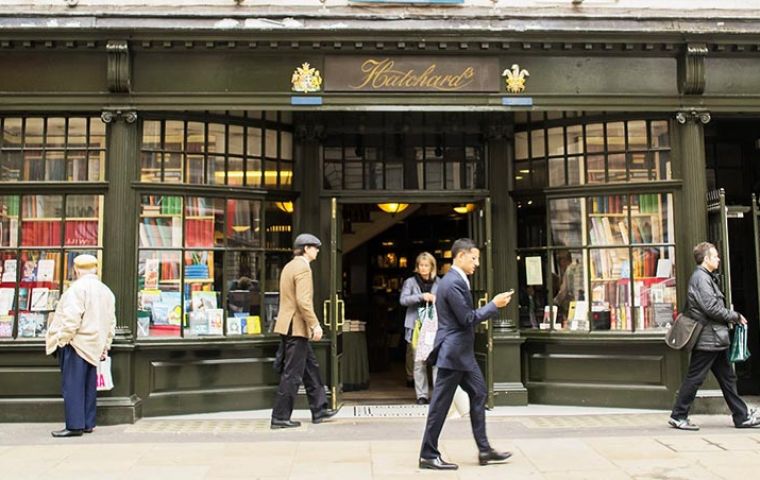MercoPress. South Atlantic News Agency
British publishing industry warns Brexit could damage record breaking export business
 Publishers Association represents book, journal, audio and electronic publishers in UK, including from fiction and non-fiction to academic and educational publishing.
Publishers Association represents book, journal, audio and electronic publishers in UK, including from fiction and non-fiction to academic and educational publishing.  Last year 36% of its exports were shipped to the European Union, making it the largest market for UK books.
Last year 36% of its exports were shipped to the European Union, making it the largest market for UK books.  Publishers Association chief executive Stephen Lotinga, said: “It's not just tariffs that could be a problem. It's the non-tariff barriers, customs checks and delays.”
Publishers Association chief executive Stephen Lotinga, said: “It's not just tariffs that could be a problem. It's the non-tariff barriers, customs checks and delays.”  You have to remember the UK publishing industry is deeply entwined with Europe”, said Mr. Daunt
You have to remember the UK publishing industry is deeply entwined with Europe”, said Mr. DauntThe UK publishing industry has warned that Brexit could damage its record-breaking export business. The boss of the Publishers Association said any tariffs or other barriers to trade post-Brexit “could be a problem”.
His warning came as the industry body reported record sales of £5.7bn in 2017, up 5% on the previous year. Exports rose by 8% to £3.4bn, to account for 60% of total income, consolidating the UK's position as the biggest exporter of books in the world.
The Publishers Association represents book, journal, audio and electronic publishers in the UK, including everything from fiction and non-fiction to academic and educational publishing.
Last year 36% of its exports were shipped to the European Union, making it the largest market for UK books.
Publishers Association chief executive Stephen Lotinga, said: “It's not just tariffs that could be a problem [post-Brexit]. It's the non-tariff barriers, customs checks and delays.”
“That means having books sat in a customs warehouse in Calais rather than in a bookshop in Duesseldorf.”
The figures contained in the Publishers Association's latest yearbook also show that sales of physical and digital books rose by 4% last year to £3.7bn. Of that exports accounted for £1.6bn, a rise of 7% on the previous year.
In some sectors exports are even more crucial. Total income from academic journals reached £1.6bn last year, with £1.4bn of that coming from exports.
James Daunt, managing director of the book chain Waterstones, exports books to his stores in the Irish Republic, Amsterdam and Brussels.
He said: “With the pound down and the Irish market strong, we have been going from strength to strength, but if the trucks all start to get backed up at the ports and can't reach the booksellers it could create real problems.”
He added there were other benefits that could be lost after Brexit: “The EU has also been very supportive of us as booksellers. It's been very active in preventing anti-competitive behavior, for instance by Amazon, and that kind of protection may not be available after Brexit.”
Mr Daunt said that over the past 30 years UK publishers have created a dominant position in securing English-language rights to books sold across Europe. He added: “You have to remember the UK publishing industry is deeply entwined with Europe”.
“Macmillan may seem to be British, but it's owned by a German conglomerate. Penguin is the same. It is part of the Bertelsmann group, also in Germany.
”The whole question of the management of rights after Brexit, depending on what agreement we have, could become much more difficult.
“It may become easier for those rights to be funneled not through London but say India or the US.”
The Publishers Association has issued a 10-point Brexit blueprint for publishing which includes a “gold standard” for intellectual property laws and copyright, “to make the most of global free trade opportunities after Brexit”.
It said it feared copyright might be viewed by trade negotiators as bargaining chips in future trade discussions.




Top Comments
Disclaimer & comment rulesCommenting for this story is now closed.
If you have a Facebook account, become a fan and comment on our Facebook Page!